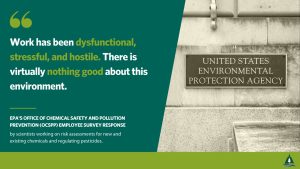EPA’s Myth of Scientific Integrity
Just days after a scathing USA Today exposé of industry domination of new chemical reviews, EPA Administrator Michael Regan issued an agency-wide memo declaring:
“We have one of the strongest and most robust scientific integrity policies in the federal family….EPA [is] at the forefront of federal scientific integrity efforts…”
This is not true. In fact, the agency’s policy is mainly rhetorical without much practical impact. Consider that EPA’s scientific integrity program –
-
- Has no investigative staff or protocol governing how to investigate allegations of misconduct. Records we obtained through the Freedom of Information Act (FOIA) indicate that from 2018 through the first half of 2021, 35 allegations were filed, 22 remained “active” (i.e., unresolved), 12 had been closed or referred, but only one complaint was deemed “substantiated.”
- Prescribes no penalty for violations of the policy, no matter how blatant. As EPA’s Scientific Integrity Officer told a reporter: “We’re not playing a blame game. The way our scientific integrity policy is written is that specific disciplinary accountability is not in our lane.”
- Provides no identifiable legal protection against retaliation for scientists who report problems or who file formal “differing scientific opinions” with senior officials.
EPA’s policy was and remains so weak that the notorious Scott Pruitt, the Trump-appointed Administrator who roiled EPA for much of his short tenure, repeatedly voiced his support of EPA’s scientific integrity policy with absolute certainty that it would not inconvenience him in the slightest.
After lavishing praise on EPA’s scientific integrity policy and program, Administrator Regan’s memo goes on to indicate that perhaps EPA could be doing a much better job:
“[L]essons we’ve learned over the past 10 years will inform our work to update and strengthen our policy…We are working on several initiatives to enhance our culture of scientific integrity” such as “identifying ways to prevent inappropriate interference.”
The only fix Administration Regan offered in his memo was to have his Scientific Integrity Officer “report annually at an executive management council meeting to outline challenges and answer questions” and he invited the officer “to brief us on the Scientific Integrity Annual Report.” An annual briefing? Hardly strong medicine.
 So, what does EPA’s scientific integrity policy mean inside the cubicles? One clue can be found in recent results of a “Climate Survey” within the branch conducting chemical risk assessments and regulating pesticides. This branch has generated considerable consternation concerning disclosures from EPA scientists that the chemical industry, through pliant managers, routinely have altered – and continue to alter – risk assessments to remove warnings needed to protect workers and consumers who come in contact with these chemicals.
So, what does EPA’s scientific integrity policy mean inside the cubicles? One clue can be found in recent results of a “Climate Survey” within the branch conducting chemical risk assessments and regulating pesticides. This branch has generated considerable consternation concerning disclosures from EPA scientists that the chemical industry, through pliant managers, routinely have altered – and continue to alter – risk assessments to remove warnings needed to protect workers and consumers who come in contact with these chemicals.
This Climate Survey was an attempt to gauge how extensive those concerns from staff scientists are. The feedback EPA received was clear and so scathing that EPA decided not to share the responses with staff. Scientist answers were laced with blistering comments such as –
-
- “Work has been dysfunctional, stressful, and hostile. There is virtually nothing good about this environment.”
- “Most staff believe that they are not protecting the public and decisions favor industry instead.”
- “It is clear to staff that they will never see a manager removed or disciplined for anything. The staff knows that their only recourse, when confronted with unethical or illegal actions by management, is to leave.”
- “People are made to cry regularly.”
- “Retaliation, intimidation, lack of transparency, improper alterations of assessments without staff knowledge.”
Yet, rather than be honest about the Climate Survey (whose results were obtained only through a threatened FOIA lawsuit), EPA management circulated a PowerPoint presentation featuring painfully clueless suggestions for “Going Forward”, such as “Mentor-mentee support”; “Develop checklists for useful information”; and instituting a “Coach for trust training series.”
Like the prison captain played by Strother Martin in the movie “Cool Hand Luke” who keeps explaining, “What we’ve got here is failure to communicate,” EPA mistakes blatant breakdowns in integrity with failures to communicate. The problem is not a failure to communicate but EPA’s unwillingness to recognize, let alone redress, repeated and engrained acts of managerial scientific misconduct that are endangering public health.
With the departure of Trump, conventional wisdom indicated that EPA would return to its role as a responsible regulator. That has not often been the case, particularly within EPA’s chemicals branch. This situation is unlikely to improve unless Biden appointees take off their rose-colored glasses to see what is really happening and take direct and decisive corrective actions to offer scientists real protections from retaliation by their managers.
 Tim Whitehouse is the Executive Director of PEER. Among other things, Tim formerly served as an EPA enforcement attorney.
Tim Whitehouse is the Executive Director of PEER. Among other things, Tim formerly served as an EPA enforcement attorney.